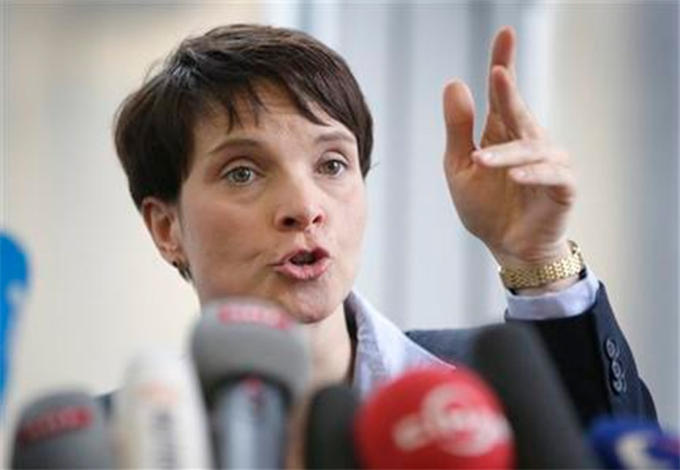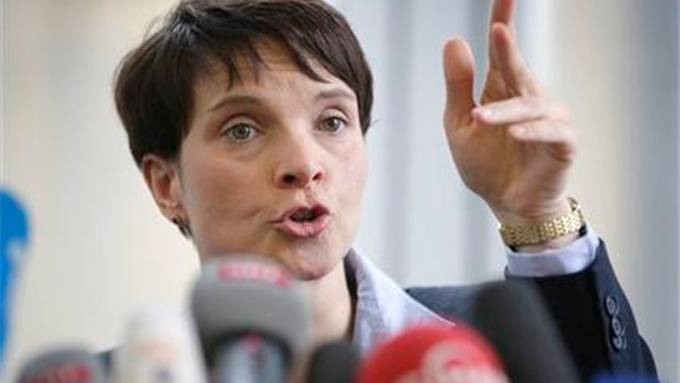Nationalist party set for gains as 3 German states vote
Source: hosted.ap.org

A rising nationalist party is expected to ride unease about Chancellor Angela Merkel's migrant policy to perform strongly in three German state elections this weekend, the first significant political test since last year's massive influx of people seeking safety and a better life.
Alternative for Germany, or AfD, formed three years ago, is wooing voters with slogans such as "ENOUGH!" and "Secure borders instead of borderless crime."
It's expected to enter legislatures Sunday in the diverse regions: prosperous Baden-Wuerttemberg in the southwest, neighboring Rhineland-Palatinate, and relatively poor Saxony-Anhalt in the east. Other parties won't share power with it, but its performance could complicate efforts to form state governments - particularly in Saxony-Anhalt, where polls give it up to 19 percent support.
Germany registered nearly 1.1 million people as asylum-seekers last year as Merkel insisted "we will manage" the challenge, a stance lauded by many but that drove others into AfD's arms.
"What she did was issue a political invitation to a great many people in the world to set off for Europe, with catastrophic consequences for the structure of a Europe of freedom," AfD leader Frauke Petry recently told foreign reporters.
Merkel is doggedly pursuing an elusive pan-European solution to the migrant crisis, even as other countries shut borders and German conservative allies demand national measures such as refugee quotas. Asked recently what would make her change course, she replied: "I can't see anything that could bring that about, because it's all well thought-through and logical."
But Petry, whose party already has lawmakers in five German state parliaments and at the European Parliament, argues that "having taken more than 1 million asylum seekers and awaiting many more, awaiting families as well, is going to cause huge problems in Germany."
Merkel said this week that for "all those who want a constructive solution, who want to move things ahead, AfD is completely the wrong party," accusing it of "working with emotions."
Merkel's own ratings have fallen over recent months but started recovering. The next national election is expected in late 2017, by when other parties hope AfD's popularity will have subsided. However, Sunday looks like being uncomfortable for both Merkel's conservative Christian Democratic Union and its national government partners, the center-left Social Democrats.
Merkel's party leads Saxony-Anhalt's government and hopes to oust center-left governors in the other two states. Chances of that no longer look so good.
In Baden-Wuerttemberg, a traditional stronghold where Merkel's CDU finished first in 2011 but lost power to a Green-led coalition, polls suggest the party could be embarrassingly beaten to first place by the left-leaning Greens.
Winfried Kretschmann, the Green governor, has a reassuringly conservative image and many prefer him to little-known CDU challenger Guido Wolf. He even sounds more enthusiastic about Merkel's refugee policies than Wolf.
Wolf and Julia Kloeckner, who hopes to become Rhineland-Palatinate's governor, tried to put a little distance between themselves and Merkel's migrant approach, calling for Germany to impose daily refugee quotas. That's something Merkel opposes but that Austria has since done - a gambit that may backfire, giving the impression of disunity.
The chancellor has seen many state-level setbacks over 10 years in power, and while a poor Sunday would likely generate new tensions, her position appears secure. There's no single obvious successor, still less a figurehead for any rebellion.
"I simply see absolutely no one in the CDU who could face off against Merkel openly, with the necessary standing inside the party and among the people," said Andrea Roemmele, a political science professor at the Hertie School of Governance in Berlin.
AfD's migrant-fueled rebound came after the party split last year and switched from its initial focus on opposition to eurozone bailouts. Its rhetoric since has caused unease, including a January interview in which Petry suggested police could shoot refugees trying to enter Germany. Prominent member Bjoern Hoecke was criticized for racism after talking about the "life-affirming African proliferation model."
The European Conservatives and Reformists group, with which it sits in the European Parliament and which includes the British and Polish governing parties, said it asked AfD's two European lawmakers to leave this month or face a vote on their expulsion. AfD said there's no majority to eject them.
AfD "seeks whatever issues suit it as a protest party," drawing voters from across the political spectrum and likely also benefiting from CDU voters staying home, Roemmele said. She stressed its appeal to protest voters, noting that it has yet to draw up a formal program.
Voters in Saxony-Anhalt's capital, Magdeburg, were divided. Retiree Harald Mueller, 72, said he "will cast a protest vote, definitely" and that refugee policy will play a major part in that - though he wouldn't specify which party he would choose.
"Merkel has done a very good job so far, but I think she has overreached herself a bit here," he said.
Others said they were sticking with the CDU and were turned off by AfD's style. Thea Tecklenburg, 76, said she thought young men heading for Germany should "help rebuild and defend their country," but criticized AfD's "agitation" and right-wing image.
AfD failed to enter the national parliament in 2013, but then won seats in five of Germany's 16 state parliaments before the migrant crisis.
Unlike in other European countries, parties to the right of the mainstream conservatives have tended to fizzle in post-World War II Germany. It remains to be seen whether AfD can buck that trend.
Still, Hendrik Traeger, a political scientist at the Magdeburg and Leipzig universities, sees the party keeping a solid though reduced "core vote" even when the refugee issue fades.
"Of course AfD is benefiting from the refugee situation, but it also benefits broadly from discontent in parts of the population with established politicians," he said.
Source: hosted.ap.org






















